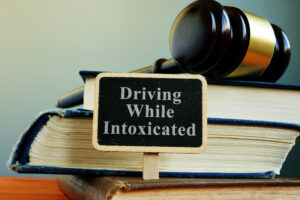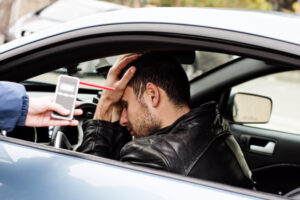Overview of Texas DWI

Under Texas law, it is illegal to “operate a motor vehicle in a public place” if you are “intoxicated”. To establish intoxication, the State must prove you lacked the “normal use of your mental or physical faculties” because of alcohol or drugs.
“Operating a motor vehicle” has a very broad definition under Texas law. In fact, the police can still arrest you for DWI – even if you are in a stationary vehicle, asleep behind the wheel, or simply attempting to start it.
For cases involving suspicion of alcohol, the State can also prove intoxication if your blood alcohol concentration (BAC) was 0.08% or higher (obtained through a breath or blood test).
When other drugs are suspected (such as marijuana), and your BAC is under .08, the State can still charge you with a DWI. These cases are typically more difficult to prove and can be successfully challenged through strong and effective representation.
Below is a general overview of DWI law in Texas and what you can expect after an arrest. If you have questions or wish to schedule a free, confidential consultation about your case, please call our office at 281-888-5581 or click here.
What are the Penalties for DWI in Texas?
The penalties for DWI in Texas are severe and increase with each subsequent offense.
For a first offense, individuals face up to $2,000 in fines, 3 to 180 days in jail, and a possible suspension of their driver’s license for up to 2 years.
A second offense can result in up to $4,000 in fines, one month to 1 year in jail, and license suspension for up to 2 years.
Penalties get worse for a third offense: a $10,000 fine, up to 10 years in prison, and license suspension. This is a felony with more severe and life-altering consequences.
Certain situations lead to enhanced penalties or charges under Texas DWI laws. For example, if someone drives while intoxicated with a child passenger under 15 (even a first-time DWI), they could be fined up to $10,000, jailed for two years in a State Jail Facility, and lose their license from 180 days to 2 years.
Administrative Penalties
In Texas, refusing or failing a chemical test has consequences. For a first-time refusal, you face a 180-day license suspension. A second offense can extend your suspension up to 2 years. Failing a chemical or blood test also leads to the suspension of your driver’s license. The duration of a potential suspension varies based on your offense history.
Additional Considerations
- Probation: In some cases, offenders may be eligible for probation. This could include regular meetings with a probation officer, alcohol and drug evaluation, and completion of an educational or treatment program.
- Annual Surcharges: Texas imposes an annual surcharge on drivers with DWI convictions to maintain their driving privileges. This surcharge can range from $1,000 to $2,000 per year for three years.
- Permanent Record: A DWI conviction will remain on the offender’s criminal record permanently. This can impact employment opportunities, professional licensing, and insurance rates.
How Do Standardized Field Sobriety Tests (SFSTs) Work?
The three standardized field sobriety tests (SFSTs) used in Texas are tools to help law enforcement determine impairment from alcohol or drugs.
These are known as “divided attention tests” — it’s about doing multiple tasks at once, like driving and watching the road. Alcohol and drugs can impair this ability and affect your driving skills. These tests measure this alleged impairment in a safe setting, but there is room for error.
Let’s investigate each test’s purpose and significance.
- Horizontal Gaze Nystagmus (HGN) Test: The HGN test checks eye reflexes by asking you to track a moving object. Officers assess smooth pursuit, nystagmus, and onset of nystagmus. Nystagmus is an involuntary jerking of your eye and is the only scientific test used to gauge your level of alleged intoxication. Four or more indicators across both eyes indicate likely impairment. The test relies on nystagmus worsening with alcohol intake.
- Walk-and-Turn (WAT) Test: The Walk-and-Turn test assesses physical ability and attention span. Participants take nine heel-to-toe steps, turn, and return. Officers check for eight impairment indicators, like balance issues or incorrect steps. Two or more indicators may signal impairment. The test simulates the multitasking needed for safe driving.
- One-Leg Stand (OLS) Test: In the One-Leg Stand test, you stand on one foot six inches up. You count aloud by thousands for 30 seconds. Signs of impairment are swaying, using arms for balance, hopping, and foot placement. It’s like the WAT, testing balance and focus together. Two or more signs indicate impairment.
- Divided Attention in SFSTs: The idea of “divided attention” is essential for these tests. It’s about doing multiple tasks at once, like driving and watching the road. Alcohol and drugs can impair this ability, affecting driving skills. These tests measure this impairment in a safe setting, but there is still room for error.
SFSTs ensure consistency but can be impacted by factors such as health issues, fatigue, anxiety, and other diseases. A police officer’s training (or lack of training) can also play a major role in your defense. Though widely accepted, these tests aren’t perfect and can vary in their results. Our firm ensures that all testing was done properly and within your legal rights. If the testing was improper, it may be possible to have the results thrown out, helping with reduced charges and dismissals.
What are the Possible DWI Defenses in Texas?
There are often many ways that a skilled Texas DWI defense lawyer can challenge the allegations against you. Here’s a summary of some common defenses:
- Lack of Probable Cause for the Stop: Law enforcement officers must have a legitimate reason, or probable cause, to initiate a traffic stop that leads to a DWI charge. Stopping a vehicle without a valid reason may lead to suppressed evidence.
- Faulty Field Sobriety Tests: Field sobriety test validity can be challenged. Physical condition, age, and external conditions may impact results. Showing unfair test conditions or subjective officer interpretation can help your case.
- Inaccuracies in Breathalyzer or Blood Tests: Defense strategies question device maintenance, sample handling, and test administration.
- Rising BAC: The defense claims the BAC was legal initially, then spiked. It suggests you may not have been drunk while driving.
- Improper Police Procedures: If cops mess up arrest steps, like not reading your Miranda rights, that can help fight charges. All rules must be followed for evidence against you to be valid.
- Medical Conditions and External Factors Affecting Test Results: Certain medical conditions and diet choices can impact breathalyzer results. Diabetes, specific diets, or mouthwash can cause false positives.
- Challenges to Blood Draw Procedures: The legality of a blood draw can be challenged on several grounds. For instance, it can be done without proper consent or a warrant. It’s also important to question who took the sample and ensure they were qualified. Additionally, we can contest the sanitary conditions during the draw.
Our team will analyze your case and develop the best defense strategy. Having a lawyer can greatly influence the outcome of your case, possibly reducing charges. In some circumstances, we can even get your case dismissed.
DWI charges in Texas can have severe consequences. Call us today to discuss your options with a DWI defense lawyer today.
Is DWI Charged as a Misdemeanor Or Felony In Texas?
In Texas, a DWI charge can be a misdemeanor or felony. It depends on the circumstances of your offense.
Here’s a breakdown to clarify this important aspect of Texas DWI law:
- Class B Misdemeanor: In Texas, a first-time DWI offense is usually a Class B misdemeanor. This occurs when someone drives with a blood alcohol concentration (BAC) of 0.08 to 0.15.
- Class A Misdemeanor Enhancement: If your blood alcohol concentration (BAC) is 0.15 or higher, or this is your second DWI offense, the charge elevates to a Class A misdemeanor. This shows a higher offense level due to greater impairment risk or a pattern of driving while intoxicated.
- Felony with a Child Passenger: A first-time DWI becomes a felony when a child passenger (under 15) is involved. This harsher penalty acknowledges the increased risk to minors. A felony can have disastrous and long-lasting impacts on your employment and future.
What is an Administrative License Revocation (ALR) Hearing?
After a DWI arrest in Texas, you deal with two things. First, criminal proceedings. Second, an Administrative License Revocation (ALR) hearing. The outcome of this hearing will determine whether your driving privileges should be suspended. The ALR process is separate from the criminal case and doesn’t depend on guilt for DWI.
Once you’re arrested for DWI and fail a chemical test, you’ll get a suspension notice. You only have 15 days to request an ALR hearing – so it’s critical to hire an experienced DWI attorney as soon as possible to obtain a hearing and avoid an automatic license suspension. This hearing lets you contest the driving suspension before it happens and gain important evidence for the criminal case. You have the right to request all evidence from the arresting officer and subpoena their appearance. If you fail to request a hearing in time, the suspension will take effect in 40 days.
Success at the ALR hearing: no evidence found for suspension. Your driving privileges stay. But if it goes against you, suspension terms differ based on circumstances. Even if you lose an ALR hearing, we can gain important evidence for your criminal case and also help you obtain a Restricted or Occupational License so you can continue driving during the suspension period.
The outcome of the ALR hearing does not directly impact your criminal DWI case in Texas. However, information and testimony obtained from the hearing can be extremely beneficial for your criminal defense.
With the ALR hearing, consulting a Houston DWI defense attorney is a wise move. Our firm can assist with the process, meeting deadlines, and strategizing to protect your driving rights. Additionally, we will help you prepare for the criminal aspects of your case.
What to Do If You’re Charged with a DWI in Texas
If you’re facing DWI charges in Texas, it’s time to act quickly and wisely. Here’s what you should do:
- Stay Calm: It’s natural to feel overwhelmed but staying calm will help you think clearly and make better decisions.
- Don’t Incriminate Yourself: You have the right to remain silent. This right is protected by the Fifth Amendment to the U.S. Constitution. You have the right to politely decline to answer questions until you have legal representation from a Houston DWI defense attorney.
- Contact Westbrook Law Firm, PLLC: The sooner you get in touch with a DWI defense attorney, the quicker they can start working on your defense. Our 20 years of experience as Houston DWI defense attorneys is your best asset in this challenging time.
Why Choose the Westbrook Law Firm for your DWI?
Our firm brings 20 years of dedicated experience to the table. We’ve helped countless clients in Houston and the surrounding areas and Counties, providing them with strong legal representation and personalized attention in every case.
Here’s what makes us stand out:
- Strong DWI Defense: Our in-depth understanding of Texas DWI laws and our experience in the courtroom give us the edge in defending our clients.
- Personalized Strategy: We know that every case is unique. We take the time to understand your situation and develop a tailored defense strategy.
- Commitment to Our Clients: We are here for you every step of the way. From the moment you reach out to us, we’re committed to answering your questions, easing your concerns, and advocating on your behalf. We work hard to protect your life, employment, and future.
When you work with a Texas DWI defense lawyer, they will examine every detail of your case. We look at the initial traffic stop and the breathalyzer or blood test results for errors. Here are some of the ways we can help:
- Challenging the Evidence: We investigate the evidence against you. The State is required to provide all evidence (known as “discovery”), including offense reports, body cam and dash cam videos, blood alcohol concentration (BAC) test results (breath and blood), and search warrants. We look for any inconsistencies or errors that could benefit your case.
- Negotiating with Prosecutors: Our experience allows us to negotiate with prosecutors. Westbrook has great relationships with the State and can use this to your advantage in defending your case. This can lead to reduced charges or even case dismissals in some instances.
- Representing You in Court: If your case goes to trial, you can count on us to provide representation. We’re dedicated to protecting your rights and achieving the best possible outcome.
Contact the Westbrook Law Firm Today
If you or someone you know is facing DWI charges in Houston, don’t wait to seek professional help. Contact the Westbrook Law Firm at 281-888-5581 to schedule a free and confidential consultation. With over 20 years of experience in DWI and Criminal Defense, we’re prepared to stand by your side and fight for the best possible outcome in your case. Remember, the right defense can make all the difference. Let us be your advocates in this important time.
At Westbrook Law Firm, PLLC, we believe in providing top-notch legal representation with a personal touch. As our client, you will meet with Mr. Westbrook along every step of the way. In addition, we are committed to ensuring that you understand every step of the legal process and your legal rights.
When you choose us, you’re getting a criminal defense team that’s invested in your success. You can call our office to schedule a free and confidential consultation or click here to schedule online.























